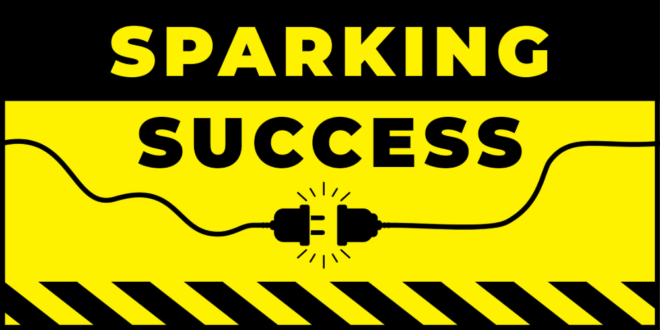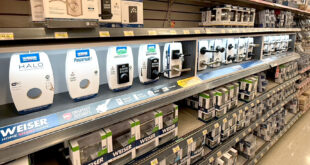As a core category for most retailers, the electrical department can get stale and sometimes overlooked unless you’re putting forth the effort to keep it fresh and meeting your customers’ needs.
By offering specialty products to bring in new customers, having well-trained and knowledgeable employees and utilizing thoughtful merchandising, you can take your electrical category to the next level.
For Angela and Richard Searcy, owners of Wilkes County Hardware in North Wilkesboro, North Carolina, their store’s electrical department caters to the needs of DIYers. From wire cutters to outlet testers, the Searcys listened to their customers when building out their electrical category.
“We’ve brought in outlet cover night lights after having several requests from customers who couldn’t find those anywhere,” Amanda says. “We thought it was an unusual product to stock, but we’ve added many other products to our electrical category we didn’t realize we needed thanks to customer input.” Another electrical product the Searcys found through their customers is replacement appliance lights.
“We can’t keep those appliance lights in stock,” she says. “We’re constantly ordering to keep up with our inventory.”
Richard says the electrical category is still a work in progress, and he is always looking to his customers for new products to bring in and curate this category.
“I’m always trying to listen, and I’m wanting to know what my customers need,” Richard says. “If I have more than one person ask if we have a certain electrical item, I know that we
need to make room in our planogram for it.”
By stocking core products and fitting in products from customer needs, Wilkes County Hardware has a well-rounded electrical category.
“If we have a diverse product selection, and we consistently have what people want, they’re going to come back time and time again,” Richard says. “Long term, that’s a good scenario.”
By providing in-depth knowledge to its customers, Decorum Hardware & Nostalgia Lighting in Falmouth, Maine, differentiates itself from its competitors. Each employee is trained not just in sales, but in the intricacies of electrical products and how they’re used.
“Our staff aren’t just salespeople—they’re experts in the electrical field,” says Kimry Corrette,
Decorum Hardware & Nostalgia Lighting manager. “They can tell you how to use the product, where it works best and any issues they may face during installation. Customers don’t come here just to buy, they come here to learn.”
By being a place where people can learn more than what’s on the sale card for the product,
Decorum Hardware & Nostalgia has entrenched itself in its community. For contractors and DIY enthusiasts, having access to employees who understand the nuances of each product has become a significant draw.
“Many times, customers come in because they’ve hit a roadblock in their project,” Corrette says. “They don’t just need a product, they need help figuring out what’s wrong. Our team can walk them through the options, offer practical advice and ensure they
leave with the right solution.”
Decorum Hardware & Nostalgia Lighting owner Nick Harding’s dedication to providing expert product knowledge is what’s kept his business around for almost 50 years. Harding has built a loyal customer base through his extensive product knowledge and created a space where customers know they can go with questions.
“We’ve been resilient, and we offer people what they want, rather than what the industry trends want you to buy,” Harding says.
“Our staff aren’t just salespeople—they’re experts in the electrical field. They can tell you how to use the product, where it works best and any issues they may face during installation. Customers don’t come here just to buy, they come here to learn.” —Kimry Corrette, Decorum Hardware & Nostalgia Lighting
After moving to their current location, Harding transitioned from having ample shelf space to having very little—just 500 square feet of salesfloor—which led him to keep catalogs, rather than have the items at his store.
“We offer people choices,” Harding says. “We can still sell them all of the products we used to, but we just have to order them. Fortunately, our customers don’t seem to mind that.”
When Harding was planning his store, which is on the first floor of a refurbished residential building, he didn’t want to clutter the floor with aisles and displays—opting for a cleaner, more open concept.
“We’ve designed the layout to make it easy for people to find what they need and get answers fast,” Corrette says. “When someone walks into Decorum, they’re usually not looking to browse—they know they’re here for something specific, and we make that process as
straightforward as possible.”
The store’s layout is also built around providing access to staff, with displays and counters that encourage interaction between the employees and customers.
“Our customers appreciate the opportunity to speak with someone face-to-face, especially when they’re dealing with electrical products where there’s little room
for error,” Corrette says. “That interaction sets us apart.”
“If someone needs a specific product, something unusual or specialized, there’s a good chance they’ll come here because they know we’ll have it.” —Kimry Corrette, Decorum Hardware & Nostalgia Lighting
By stocking hard-to-find products, Harding sets himself apart from the competition. “Big-box stores may offer the basics,” Corrette says. “But if someone needs a specific product, something unusual or specialized, there’s a good chance they’ll come here because they know we’ll have it.”
Setting your store apart from your competition can also include offering specialized services that your competition doesn’t. Decorum Hardware & Nostalgia Lighting’s two main forms
of revenue are traditional lighting repair and custom lighting construction.
Some of the areas the store specializes in include chandelier restoration, dimmer switch repairs, outdoor lighting restoration and cord replacements, Corrette says.
When a customer comes to them with a lighting need, a staff member will learn the entire scope of their project and how the lighting is a part of that
project, he says.
Since Decorum custom makes all of its light fixtures, they’re able to offer their customers full customization from the style, materials and dimensions.
“A lot of the lights we create are for an unusual need,” Harding says. “People come to us because they can’t find what they need at a traditional hardware store.”
Shining Stars
The electrical category is a broad one and extends far beyond traditional products. Finding niche products to supplement your electrical department year-round is a great way to snatch add-on sales.
- Smart Home
- Electrical doorbells
- Motion-activated flood lights
- Smart plugs
- Security systems
- Emergency Preparedness
- Flashlights
- Batteries
- Weather radios
- Generators
- Holiday
- Christmas light repair kits
- Pre-lit trees
- Christmas lights
- Light timers
- Lightbulbs
- LED
- CFL
- Edison bulbs
- Color-changing lightbulbs
- Impulse
- Extension cords
- Surge protectors
- Electrical tape
- Outlet covers
5 Must-Have Electrical Tools to Stock for DIYers
- Circuit/Voltage Testers
- A tester checks if the power to a source is turned off so you can safely proceed with repairs.
- Lineman Pliers
- With several functions in one tool, lineman pliers allow users to grip, twist, cut, pull, crimp and bend wires.
- Electrical Tape
- Used to cover and insulate wires, electrical tape is specially made of plastic vinyl to easily adhere to wires.
- Insulated Screwdrivers
- Made with special handles that safeguard against electrical sparks, an insulated
screwdriver protects against electrocution.
- Made with special handles that safeguard against electrical sparks, an insulated
- Flashlight
- Once the power is off, a flashlight provides much-needed light to see what you’re
doing while you work.
- Once the power is off, a flashlight provides much-needed light to see what you’re
 Hardware Retailing The Industry's Source for Insights and Information
Hardware Retailing The Industry's Source for Insights and Information








